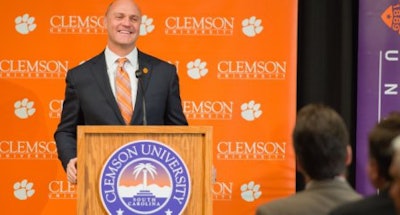 Jim Clements’ national roles include chairman-elect of the Council of Presidents of the Association of Public Land-Grant Universities.
Jim Clements’ national roles include chairman-elect of the Council of Presidents of the Association of Public Land-Grant Universities.COLUMBIA, S.C. ― Jim Clements, president of West Virginia University since 2009, will take the helm at Clemson University in January, the school announced Monday.
Clements will become Clemson’s 15th president, Board of Trustees Chairman David Wilkins said in announcing the selection Monday in Clemson. He succeeds Jim Barker, who announced plans in April to retire after 14 years and become an architecture professor at the school.
Barker has agreed to remain as president until Clements takes over, Wilkins said.
“The bottom line is this: The board is convinced we got the very best person to be our next president. He is the right fit for Clemson University,” Wilkins said.
Wilkins noted that Clements is coming from a land-grant university, so he understands Clemson’s mission. Clements’ national roles include chairman-elect of the Council of Presidents of the Association of Public Land-Grant Universities.
Wilkins praised Clements’ job at West Virginia University, saying the college set records in private fundraising, enrollment and research funding during his tenure. The university is in the midst of nearly $1 billion in construction projects on campus, its university health system and student housing.
Clemson will match Clements’ salary at WVU of $775,000 through public and private funds, Wilkins said. The state’s Agency Head Salary Commission will determine how much of that will be funded by taxpayers.
Clements previously worked as provost and vice president for academic affairs at Towson University in Maryland.
Clements’ background is in computer science. He earned a bachelor’s in computer science and a master’s degree in operations analysis from the University of Maryland Baltimore County, as well as a master’s in computer science from Johns Hopkins University, according to information from Clemson. He chaired the department of computer and information sciences at Towson.
Clements said in a letter released by WVU after the announcement that he hadn’t been looking to leave West Virginia University and that, when Clemson officials initially called, he said only that he loved his job. Three of his four children attend West Virginia University.
“When my family arrived at WVU we didn’t realize how much we would fall in love with the state and the university. Beth and I knew that it would be very difficult for any university to convince us to leave WVU,” he said in the letter. “However, after much thought, reflection and prayer, Beth and I decided that this is an opportunity that we couldn’t pass up.”
He noted that his wife’s family lives near Clemson and her two brothers and sister-in-law are Clemson graduates.















